Scientists led by the Dalian Institute of Chemical Physics (DICP) in China have begun a large-scale project demonstrating PV powered production of hydrogen, which is then used to convert carbon dioxide into methanol. The demonstration project was certified by China’s Petroleum and Chemical Industry Federation and is expected to run for 10 months, with plans for expansion further down the line.
The “Liquid Solar Fuel Production demonstration Project” combines a 10 MW PV array with an electrolyzer and equipment for CO2 hydrogenation. The electrolyzers utilize an undisclosed catalyst developed at DICP, which it describes as a “low-cost and long-lifetime electrocatalyst for alkaline water electrolysis.” According to the institute, the facility currently has capacity to produce 1,000 cubic meters of hydrogen per hour and requires less than 4.3 kWh of electricity per cubic meter.
Hydrogen is then used to convert CO2 into methanol, driven by another catalyst, this time a mixed metal oxide. DICP reports that the demonstration facility currently has capacity to produce 1,000 tons of methanol per year, reaching 99.5% purity.
Expansion plans
“Our overall goal is to eliminate CO2 emissions by utilizing CO2 as a carbon source alongside renewable energy,” DICP Professor Can Li told pv magazine. “The next plan is to expand the scale from 1,000 ton-methanol/y to 10,000 ton-methanol per year, or even a 100,000 ton-methanol per year.”
Popular content
Methanol produced at the plant can be supplied to the chemical industry, or stored and used to produce hydrogen again. And despite the major expansion plans, Li points out that the project is ultimately a technology demonstration, and does not come with a detailed business model at this stage.
Large-scale, PV powered hydrogen production is gaining ground commercially, with projects announced recently in the Middle East and Australia, but still struggles with high costs and lack of infrastructure to make good use of the hydrogen. Using the hydrogen in CO2 conversion to methanol meanwhile, has shown promise but remains largely in the research stage.
This content is protected by copyright and may not be reused. If you want to cooperate with us and would like to reuse some of our content, please contact: editors@pv-magazine.com.



I thought everyone was against CO2?